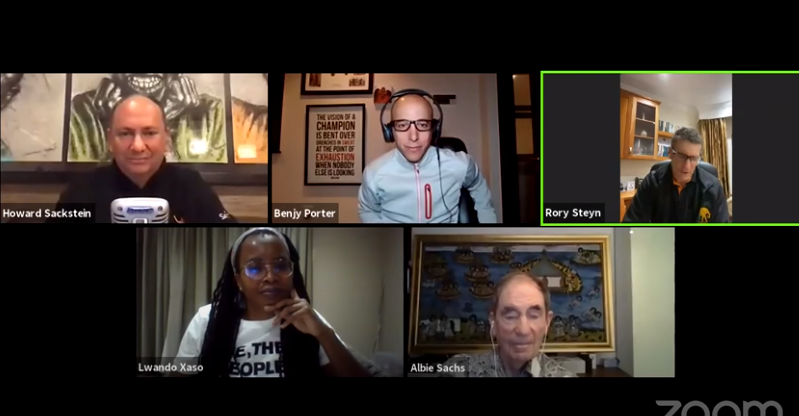
SA

Mandela – not just Mr Nice Guy
JORDAN MOSHE
These were the reflections shared by former Constitutional Court Judge Albie Sachs, and one of Madiba’s bodyguards, Rory Steyn, in a special panel discussion held on Saturday night. In celebration of Mandela Day, the panellists shared their encounters with the beloved former president, and fond memories of the man they worked with.
“Mandela is often presented as ‘Mr Nice Guy’, and he was,” said Sachs. “But he wasn’t just that. He was a freedom fighter. He was tough and willing to fight. He took hard decisions, and was prepared, if necessary, to give his life for the cause. Throughout his life, a belief in humanity lay at his core.
“I get a little irritated when people speak about the father of a nation who gave us our freedom. He never wanted the title, and it’s actually inappropriate, the nation was created by the people. He was a wonderful listener, a great embodiment of the people, and that’s the greatest quality he had.”
Steyn, who served as one of the four security team leaders charged with the protection of Mandela, remembers his service fondly.
“They were the best years of my life,” he said. “I was privileged to have served Madiba for five extraordinary years which I’ll never forget.”
At the time that Madiba came into office, Steyn was a member of the dreaded John Vorster security branch. When former President FW de Klerk made the historic announcement in 1990 that he would release Mandela and unban the African National Congress (ANC), Steyn found himself without a job.
“My commanders didn’t know what to do with me, a naïve lieutenant,” he recalled. “Someone said I should set up a VIP protection unit, and that’s what I did.”
Four years later, Steyn found himself working with the ANC’s security to ensure the safety of South Africa’s number one: Mandela himself.
“We had to integrate with the ANC bodyguards and intelligence personnel that were our sworn enemies the week before,” he said. “As the commander of a police VIP protection unit, I found myself spending three quarters of my working day doing advance security, going to each venue at which Mandela would appear, and making sure it was secure.”
Steyn recalled the day in May 1994 that Mandela was inaugurated, remembering receiving a message that the president would be appearing at Ellis Park Stadium at a soccer match immediately after his inauguration ceremony at the Union Building.
“Who goes and does that literally half an hour after becoming the first democratic president?” said Steyn. “Madiba did just that.
“Someone astute on the organising committee decided that if we put 60 000 soccer fans in Ellis Park and screened the proceedings from Union Buildings on the big screen, that’s 60 000 fewer people clogging up the M1 going to Pretoria.”
Steyn and his team were tasked with conveying 184 VIP visitors to a lunch held in Mandela’s honour, including heads of states, government officials and others, even royalty.
“Our job was to move the motorcade from Joburg to Pretoria,” he recalled. “Among presidents, you have an order of precedence determined by those who have been in office the longest, with dictators at the top. These included Gaddafi, Arafat, Castro, Mugabe, and others.”
“You try going up to a dictator as a cop to tell him we need to leave now. Good luck with that.”
After successfully negotiating the motorcade, Steyn returned to Ellis Park to secure the presidential suite and await Mandela’s arrival to greet the teams at half-time.
“The motorcade arrives at half-time, but instead of going to the suite, Mandela goes out onto the field of play in front of 60 000 celebrating fans,” Steyn remembered.
“It was an absolute celebration. People were ecstatic. Madiba greets the teams, goes back up in the lift, makes his apologies, and goes to host the VIPs for lunch at Sun City.”
With Madiba safely in his bullet-proof vehicle, the motorcade prepared to set out. However, it wasn’t moving.
Steyn recalled, “The team leader calls the bodyguard in the vehicle and asks what’s going on. We see Mandela trying to open the door and wanting to get out after just having got in. He gets out, and starts heading to the back of the reception hall and towards the vehicle ramp we’re supposed to be driving along.”
The only man back there is an old school, apartheid-era police colonel, whose eyes are getting bigger as Mandela approaches him.
“Madiba stops in front of him, puts out his hand, and says, ‘Colonel, from today, you are our police, too. I want you to know that from now, it’s not you and us. You are our police as well.’”
The man began crying, and as the tears ran down his face, Madiba patted him on the shoulder, comforted him, and left.
“If you had smacked me on the nose that day, I would have been less surprised,” said Steyn. “I didn’t believe the stuff Mandela said when he came out of jail about South Africa being for all. I was a cynic.
“One hundred and eighty four of the world’s most important people could just wait because that colonel needed to hear a message. It said to me that on the day Mandela became our president, he started implementing his agenda of reconciling South Africans. The colonel represented a system which had pursued, arrested, tried, convicted, and imprisoned Mandela for 27 years, yet he found it in his heart to speak to him.
“From that day, in spite of all my training, I was so amazed that I said I would give the new South Africa a full go. I bought into the dream, and I still believe in it. I still miss Madiba today.”




